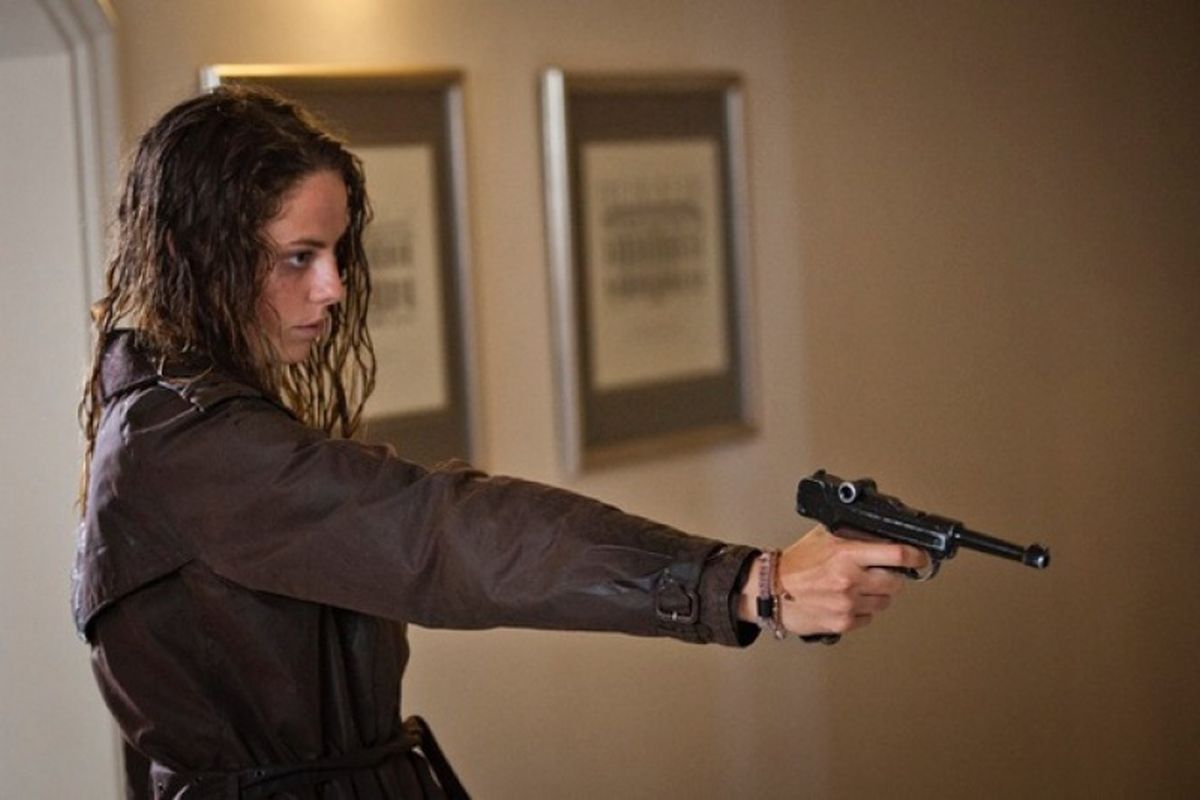★½
“Toothless tigers.”
 It is pretty close to an article of faith that no movie starring Yukari Oshima and Cynthia Khan can ever be entirely worthless. This film, however, shakes that belief to its very foundation. Not least because despite the cover and credits, found just about everywhere (including here), it barely stars them – indeed, Khan doesn’t even show up for the finale, with absolutely no explanation provided. This is included here, mostly as a warning, and because I’m a stickler for completeness with regard to their filmographies. Though in this case, I suspect, I’m less a stickler and more the sucker.
It is pretty close to an article of faith that no movie starring Yukari Oshima and Cynthia Khan can ever be entirely worthless. This film, however, shakes that belief to its very foundation. Not least because despite the cover and credits, found just about everywhere (including here), it barely stars them – indeed, Khan doesn’t even show up for the finale, with absolutely no explanation provided. This is included here, mostly as a warning, and because I’m a stickler for completeness with regard to their filmographies. Though in this case, I suspect, I’m less a stickler and more the sucker.
The plotline is…obscure. There’s a gloriously fractured English synopsis here, with sentences such as “Nga Wah finds her husband fevering with a girl.” This includes some information I would never have guessed, such as Khan’s character (Sally in this synopsis, Rose in the film I watched) being the daughter of the department store owner. I figured she was just a hired bodyguard like Oshima/Butterfly (Oshima), with the general manager of the store actually being the owner’s son. So, everything which follows should be taken as less than gospel. Or as gospel, if you’re of an atheist persuasion, I guess.
The plot concerns a department store CEO who is being threatened by the son (Chow) of a former business partner, over a debt supposedly incurred by the father. Rose & Butterfly are brought in to protect him. The store’s manager is also being threatened: he has a wife who is more interested in material goods and their acquistion, than anything else. There’s also a computer salesman who is a dead-ringer for the businessman, and so is hired to take over the business for five days. At first, I thought this was going to end up tying together with the debt, and the look-alike would end up being kidnapped, with Rose & Butterfly going in to rescue him. Never happens: those two angles completely fails to go anywhere near each other.
Indeed, the film has, at most, ten minutes of action. It is, admittedly, not bad action, with both ladies delivering at the level to which we’ve become accustomed. Khan has a particularly good battle around a playground, and Oshima gets her chance to shine in the (inexplicably solo!) finale. However, the rest of the running-time is occupied by crappy attempts at comedy, with hints of romance. This likely reaches its nadir in a sped-up shopping scene, which appears to have strayed in from the reject pile of Benny Hill.
Taiwanese film has long had a bad rep for churning out poorly-made knockoffs of Hong Kong products. Previously, I’ve sometimes wondered where that came from, as I’ve seen a number of entries which, if admittedly cheap, were little if any less entertaining, e.g. The Top Lady of Sword. However, there have been cases where its poor reputation has been entirely justified – Super Cops comes to mind. Largely through being guilty of wanton, wholesale misdirection, this is likely the worst offender I’ve ever seen, and that’s saying quite a lot.
Dir: Sek Bing-Chan
Star: Yukari Oshima, Cynthia Khan, Billy Chow, Chung Kai Cheung





 There seems to have been a sudden surge of gynocentric takes on Taken (as it were), with first
There seems to have been a sudden surge of gynocentric takes on Taken (as it were), with first  Disease has wiped out most of civilization, and left those who have survived, scrambling to cope. Better equipped than most are sisters Jenny (Rothe), Sarah (Winters) and silent little Danika (Jones). For their father was a doomsday prepper, who created a “bug out” cabin in the desert, stocked with all the necessities to survive. However, neither he nor their mother are around any longer: the former died during the crisis, and the latter went out to seek help and never returned. So it’s all down to the sisters, who have been reminded about the golden rule, time and again, by their Dad: do not let anyone in, under any circumstances.
Disease has wiped out most of civilization, and left those who have survived, scrambling to cope. Better equipped than most are sisters Jenny (Rothe), Sarah (Winters) and silent little Danika (Jones). For their father was a doomsday prepper, who created a “bug out” cabin in the desert, stocked with all the necessities to survive. However, neither he nor their mother are around any longer: the former died during the crisis, and the latter went out to seek help and never returned. So it’s all down to the sisters, who have been reminded about the golden rule, time and again, by their Dad: do not let anyone in, under any circumstances.
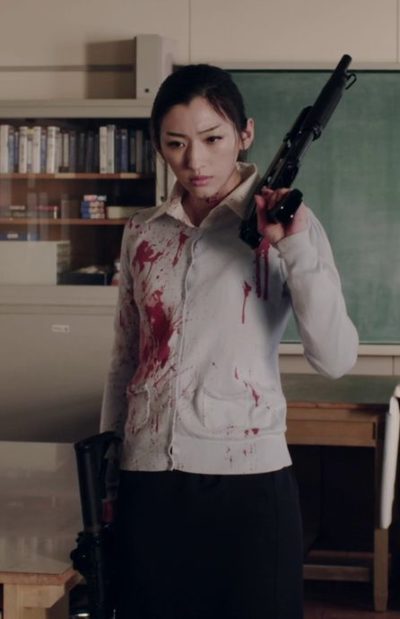 A bus full of Japanese schoolgirls includes the quiet, poetry-writing Mitsuko (Triendl), who drops her pen. Bending down to pick it up, she thus survives the lethal gust of wind which neatly bisects, not only the bus, but the rest of her classmates. Ok, film: safe to say, you have acquired our attention. [Not for the first time the director has managed this: the opening scene of his Suicide Circle is one we still vividly remember, 15 years later]
A bus full of Japanese schoolgirls includes the quiet, poetry-writing Mitsuko (Triendl), who drops her pen. Bending down to pick it up, she thus survives the lethal gust of wind which neatly bisects, not only the bus, but the rest of her classmates. Ok, film: safe to say, you have acquired our attention. [Not for the first time the director has managed this: the opening scene of his Suicide Circle is one we still vividly remember, 15 years later]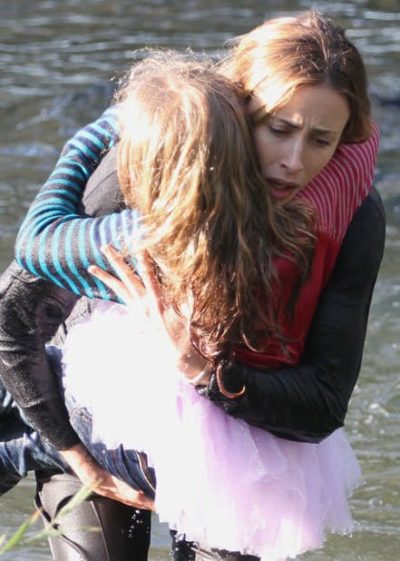
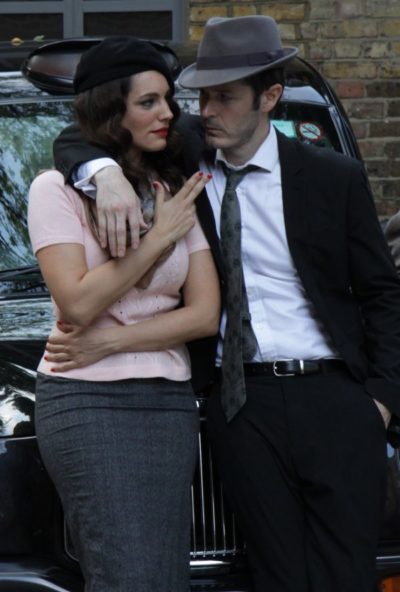 Kate’s (Brook) life has fallen apart: she has just been told the store she works at is closing because the owner is cashing in on a redevelopment offer; her boyfriend has dumped her; and Kate’s attempt at suicide by gas oven is doomed since she failed to pay the bill. What’s a girl to do? The answer is apparently, take inspiration from her heroine, Bonnie Parker. But rather than robbing banks, Kate teams up with her other disgruntled work colleagues, hatching a daring plan to copy the key to the store, seduce the safe combination out of the firm’s accountant, Mat (Williams) and plunder the ill-gotten gains.
Kate’s (Brook) life has fallen apart: she has just been told the store she works at is closing because the owner is cashing in on a redevelopment offer; her boyfriend has dumped her; and Kate’s attempt at suicide by gas oven is doomed since she failed to pay the bill. What’s a girl to do? The answer is apparently, take inspiration from her heroine, Bonnie Parker. But rather than robbing banks, Kate teams up with her other disgruntled work colleagues, hatching a daring plan to copy the key to the store, seduce the safe combination out of the firm’s accountant, Mat (Williams) and plunder the ill-gotten gains.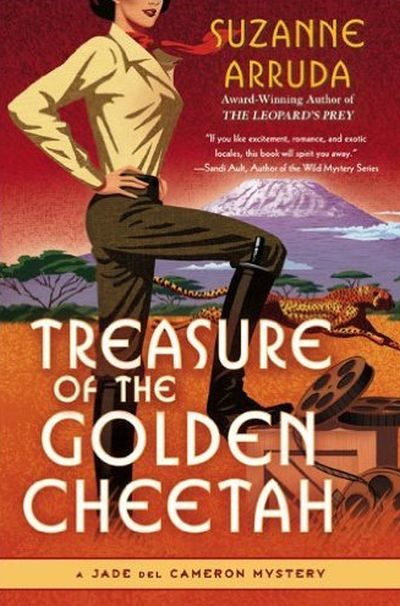 In the 10th century B.C., the kingdom of Sheba (or Saba –the S and Sh sounds were still fluid in the Semitic alphabets of that day) straddled the Arabic and African sides of the southern entrance to the Red Sea, and enjoyed considerable income from its control of that trade route. Both the Old Testament books of I Kings and II Chronicles record a state visit by the Queen of Sheba to King Solomon. Neither of these writers record her name (it varies in the legends, but the most common name given is Balkis or Belkis –English transliterations vary) or much about her, and written records from Sheba at this time have not survived; but she’s also mentioned in the Koran. Jewish, Arabic and Ethiopian legends (the latter written down in the ancient writing Kebra Negast, or “Glory of Kings”) some of which probably preserve actual handed-down oral history, greatly elaborate the story, and the latter makes Solomon out to be the father of her son and heir, Menelik. (The royal house of Ethiopia historically claimed descent from Solomon through Menelik.) The legends of the Masai and other African peoples south of Ethiopia also credit Menelik with a great (and obviously historically memorable) expedition through their territories. This real-life material provides the basis for Jade del Cameron’s fifth adventure.
In the 10th century B.C., the kingdom of Sheba (or Saba –the S and Sh sounds were still fluid in the Semitic alphabets of that day) straddled the Arabic and African sides of the southern entrance to the Red Sea, and enjoyed considerable income from its control of that trade route. Both the Old Testament books of I Kings and II Chronicles record a state visit by the Queen of Sheba to King Solomon. Neither of these writers record her name (it varies in the legends, but the most common name given is Balkis or Belkis –English transliterations vary) or much about her, and written records from Sheba at this time have not survived; but she’s also mentioned in the Koran. Jewish, Arabic and Ethiopian legends (the latter written down in the ancient writing Kebra Negast, or “Glory of Kings”) some of which probably preserve actual handed-down oral history, greatly elaborate the story, and the latter makes Solomon out to be the father of her son and heir, Menelik. (The royal house of Ethiopia historically claimed descent from Solomon through Menelik.) The legends of the Masai and other African peoples south of Ethiopia also credit Menelik with a great (and obviously historically memorable) expedition through their territories. This real-life material provides the basis for Jade del Cameron’s fifth adventure.

